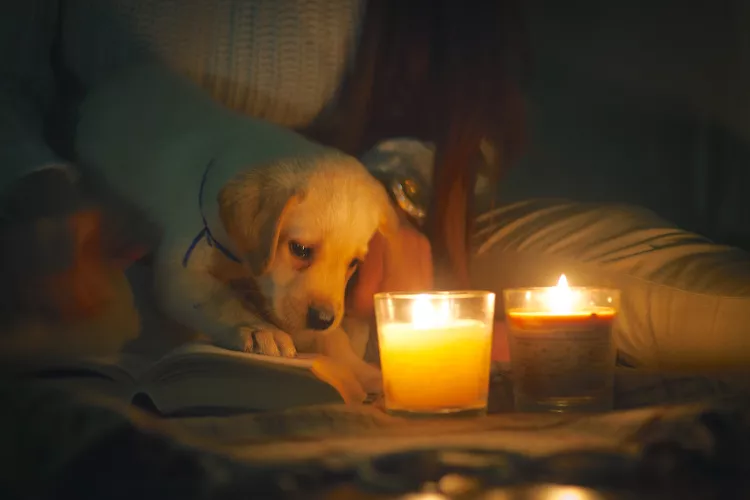What to Do if Your Dog Eats a Candle

Many dogs like to get into items around the house, often nibbling on things that are not meant to be eaten. Dogs and puppies may chew items out of boredom or hunger. This may include candles, especially those that are scented. What should you do if your dog ate a candle? Are candles dangerous to dogs?
Are Candles Harmful to Dogs?
Some candles contain chemicals or essential oils that can be harmful to dogs. Fortunately, most have a low enough concentration of these that they will not make dogs sick after eating them. However, if your dog eats a large amount, he may develop vomiting, diarrhea, or other signs of illness. Essential oils to avoid include various types of mint, various types of citrus, cinnamon, tea tree, pine, ylang-ylang, and more. These may have a variety of toxic effects on dogs if enough is ingested.
Wax candles are typically made from paraffin, beeswax, or soy. None of these materials tend to be poisonous to dogs. When ingested, they tend to soften and pass through the dog's intestinal tract without issue. However, large pieces my cause an intestinal blockage. Soy-based candles are softer and pose less of a risk.
Perhaps the most dangerous parts of candles are the wicks and the metal parts. Long wicks can become tangled up in the intestines, causing a linear foreign body that requires surgical treatment. Metal parts in the wick and the candle base may also become lodged in the GI tract. In addition, sharp edges can puncture or tear the lining of the GI tract, leading to an emergency situation.
What to Do If Your Dog Ate a Candle
If you find evidence that your dog has eaten a candle, first check to see how he is acting. Is he lethargic or in distress? Do you notice panting or labored breathing? Has he had any vomiting or diarrhea? If you notice these or any other signs of illness, it's best to contact your veterinarian for advice.
Next, try to determine what kind of candle your dog ate and how much of it was ingested. Some dogs will chew on candles but not swallow them, leaving behind a mess for you but saving their own tummies from feeling sick. Others will eat every last piece, even sometimes the wick and metal base. If your dog swallowed a long wick or a large metal base, then a vet visit is the best option. If you have any doubts about the toxicity of the candle, visit your vet immediately. Bring any remaining pieces of the candle and the packaging, if available.
Warning
You should not induce vomiting unless your vet advises you to do so. This may increase the risk for aspiration or damage to your dog's upper GI tract.
If your dog seems fine and you think that only a small amount of candle was eaten, then it's important to watch your dog over the next few days. Consumption of candle wax tends to have a laxative effect and leads to diarrhea or soft, greasy stool. If the diarrhea is watery, bloody, or doesn't improve within a day, contact your vet.
Alternatively, some dogs may experience mild constipation after eating a candle. If your dog is straining or goes more than two days without a bowel movement, contact your veterinarian.
If your dog has a decrease in appetite, lethargy, or vomiting, contact your vet right away. Do not give over-the-counter medications without first asking your vet for recommendations. Look for remnants of the candle in your dog's stool—it should pass within a few days. However, if a small amount was ingested, you may never see this pass.
Keeping Your Dog Safe
If you have a dog that likes to nibble on household items, or if you're not sure, then it's important to keep all candles out of reach. Place candles up high where your dog cannot reach them. Store candles not in use behind closed doors, like in a closet or cabinet.
If your dog gets into things around the house on a regular basis, you may want to consider keeping your dog crated when he is unsupervised. If a crate is not an option, consider a small room with dangerous items completely removed.